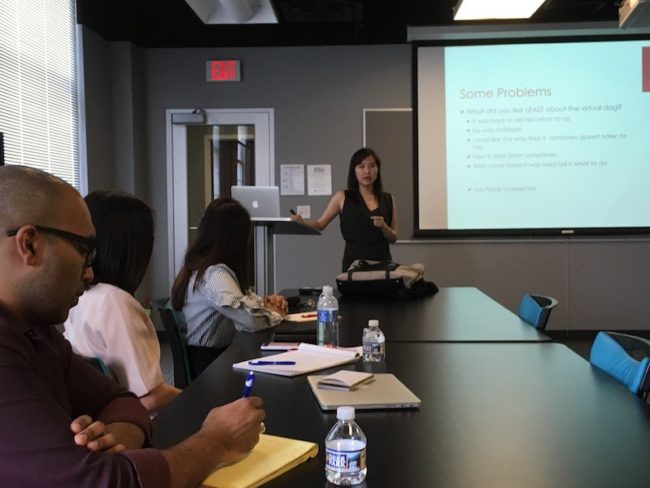Virtual experiences affect how you think, feel and behave, even outside of the virtual world.
As part of the Temerlin Advertising Institute’s Visiting Scholar Lecture Series April 13, Sun Joo (Grace) Ahn revealed the direction of past, current and future research on virtual reality. Ahn is the Assistant Professor of Advertising and Director of Games and Virtual Environments Lab at the University of Georgia.

Ahn described virtual reality technology as “new media.” The use of digital media as a persuasive tool is a novel concept resulting from its availability and effectiveness.
Ahn and her team conducted a study in which they created a “virtual fitness buddy”—a virtual pet that motivated children to exercise. The idea was inspired by the American Heart Association’s study stating that pet owners are much more physically active than non-pet owners.
“It turns out that when people don’t exercise for themselves, they still have to walk the dog,” Ahn said.
Ahn and her team allowed children to set physical activity goals for the virtual pet.
“Once they meet the physical activity goals, they get the incentive from the virtual pet by allowing the kids to teach different levels of tricks to the virtual pet,” Ahn said. “They’re also able to see a level of vicarious experience; when they exercise and meet a physical activity goal, the virtual pet increasingly becomes fitter, thinner, more responsive and generally just a happier pet.”
The program generated positive results.
“The results basically showed us that the kids with the virtual pet exercised 1.09 hours in addition, daily, to the children in the control group,” Ahn said. “This was huge.”
Although this experiment applied only to children, Ahn believes that virtual reality can benefit adult health in other ways.
Ahn proposed that a two-minute simulation be used with a patient’s doppelgänger to show the effects of certain conditions.
“Then you would be motivated to read any further information that follows,” Ahn said.
These systems should be easy to implement. According to Ahn, the kiosk information centers are portable and easy to use in a doctor’s office.
A similar tool drawing on the power of self-bias forms the cornerstones of the Coca-Cola “Share a Coke” campaign.
The campaign has proven to be not just the most successful one in Coca-Cola’s history, but also possibly the most successful advertising campaign ever due to its personal touch.
“The positive self-bias helps you sleep at night because it makes you feel a little bit better,” Ahn said.
Personalization can be enhanced with virtual doppelgängers; images and avatars can be used and controlled by third parties such as advertisers.
“The idea of, say, me sitting at home watching television and on a commercial, my avatar comes out and says, ‘Grace, I know that you like Coke. I know because I am you, and I understand you—I know you,’” Ahn said. “So, the question is then, can you say no to yourself? Can you say no to an endorser that looks exactly like you?”
Psychology suggests that the answer is no.
“If the self is endorsing It, it’s really hard to say no to yourself,” Ahn said. “The self and the other and the boundary between these two identities is really blurred in virtual worlds.”
The distinction between the virtual self and the human self begins to blend.
“There have been cases where people have found their profile photos used for advertisements that they never agreed to be on,” Ahn said.
This untapped realm of social media could have unexpected repercussions, such as the potential compromising of people’s ability to think for themselves and make decisions.
“The power of these self-images, the power of their persuasiveness and the absence of laws mediating their use… We’re not ready,” Ahn said.
However, these same criteria—the persuasiveness, power and absence of repercussions— are what make digital media so appealing to advertisers.










